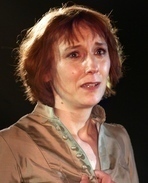SITE GUIDE
SEARCH
REVIEWS
REVIEW ARCHIVES
ADVERTISING AT CURTAINUP
FEATURES
NEWS
Etcetera and
Short Term Listings
LISTINGS
Broadway
Off-Broadway
NYC Restaurants
BOOKS and CDs
OTHER PLACES
Berkshires
London
California
New Jersey
DC
Philadelphia
Elsewhere
QUOTES
TKTS
PLAYWRIGHTS' ALBUMS
LETTERS TO EDITOR
FILM
LINKS
MISCELLANEOUS
Free Updates
Masthead
Writing for Us
A CurtainUp  London Review
London Review
 London Review
London ReviewThe Lady from the Sea
|
A mermaid, gasping for breath. . . She can't get back to the sea again, she's lost her way. That's why she's dying in the thin water, you see.—Ballested
|

Lia Williams as Ellida
(Photo: Simon Annand) |
Lia Williams plays Ellida , the eponymous lady from the sea and who is in thrall to the mysterious, dark power of a past lover who shares her kindred with the sea. With an otherworldly, elfin quality, she is like a mermaid from a folk tale trapped on dry land. Her practically transparent skin could almost be made of water, her eyes are preternaturally pale and she has a shock of short red hair. Combined with this unearthliness is her mental illness and Lia Williams' performance could be study in neurotic distraction. Her eyes wander from side to side, rarely fixing on a single object and she grows frantic at the tiniest provocation. Nevertheless, other characters seem a bit drab next to her illuminating if demented charisma.
The rest of the cast provide solid support. Jonathan Hackett is the kindly, true Dr Wangel who seeks to gain back his wife by releasing her. His two daughters are played by Fiona O'Shaughnessy as Hilde the engagingly blunt scamp and Alison McKenna as Bolette the eldest daughter trapped by domestic management. Chris Moran plays the ashen Lyngstrand, a dying, egoistical artist with Uriah Heap-style cringing which does not disguise his essential selfishness.
Jason Southgate's design is a starkly populated vacuum, with small islands of set separated and dotted around the auditorium. A veranda, an arbour and a rocky pool are scattered about with the black stage peeping through in between, just as the Wangels live their separate lives in an unconnected diaspora of a household. Long thing panels of sky are just visible on the sides of the set, so the audience also feel they are in the high-sided fjord which is suffocating Ellida.
Frank McGuinness' translation is exemplary, with all of Ibsen's poetry and imagery evoked without seeming high-flown or unnaturalistic. With a strongly conversational rhythm, the version feels more like an original play than a translation. Like the Arcola's Enemy of the People, this is a classic production of a classic play, with excellent writing and a strong cast.
|
THE LADY FROM THE SEA
Written by Henrik Ibsen In a new version by Frank McGuinness Directed by Hannah Eidenow Starring: Lia Williams With: Jonathan Hackett, Alison McKenna, Fiona O'Shaughnessy, Sean Campion, Chris Moran, Jim Bywater, Christopher Obi Set Design: Jason Southgate Costume Design: Lorna Ritchie Lighting: Michael Nabarro Composer: Melanie Pappemheim Sound: Giles Perring Running time: Two hours 40 minutes with one interval Box Office: 020 7503 1646 Booking to 31st May 2008 Reviewed by Charlotte Loveridge based on 2nd May 2008 performance at the Arcola Theatre, Arcola Street, London, E8 2DJ (London Overground: Dalston Kingsland) |
|
REVIEW FEEDBACK Highlight one of the responses below and click "copy" or"CTRL+C"
Paste the highlighted text into the subject line (CTRL+ V): Feel free to add detailed comments in the body of the email. |
|
London Theatre Tickets Lion King Tickets Billy Elliot Tickets Mighty Boosh Tickets Mamma Mia Tickets We Will Rock You Tickets Theatre Tickets |




